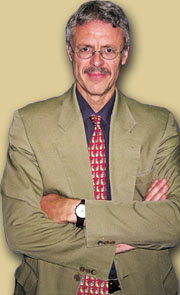Eric van der Linden arrived in Ljubljana in June 2000, as head of the European Commission Delegation to Slovenia. The small Alpine nation is considered a frontrunner among EU candidate countries. The recently released European Commission report on Slovenia's progress (available online here as a PDF file) was also mostly positive.
We sat down to talk with Eric van der Linden about Slovenia's road ahead.
Central Europe Review: We often hear about what the European Union can offer Slovenia in terms of development aid, security, etc... but what can a small country like Slovenia (pop. 2,000,000) offer the EU?
Eric van der Linden: Slovenia, given its geographic position, would be an asset for the European Union as far as developing relations with southeastern Europe, and in contributing to creating peace, security and stability, which are necessary to have a really secure, stable Europe.
The Commission issues 13 regular reports on the progress of candidate countries towards accession. What are your thoughts on the recent report on Slovenia?
First of all, I think it was the most positive report that has been written up until now. Enormous and significant progress has been made in many, many areas, in particular an area which we had until now underlined, like the backlog in court cases.
A lot of progress has been made. Progress has also been made in the important internal market issues, in justice and home affairs. In fact, I could name practically all the chapters. There is one area, and I mentioned this also in Parliament [on 14 November], where more efforts are necessary but the authorities are aware of this; it concerns regional policy.
Now, as far as the administrative capacity [of Slovenia] is concerned—there is not a lack of it. In fact, I think that Slovenia has a better record than most other candidate countries, but more needs to be done. One thing is to transpose community legislation into the national legal framework, another is to implement it and to enforce the implementation. Institutions have been created, and a lot has been accomplished, but more still needs to be done.
You visited a high school in Maribor recently. How does the reaction between generations differ with regard to the EU? And what was the general response of students?
Well, I was positively surprised by the questions raised by the students. It is very important to address the students—be it of the last years of high school or university—because they are also part of those who have to vote in a referendum for or against membership.
Eurobarometer [public opinion surveys conducted on behalf of the European Commission] has shown that the younger generation is rather skeptical as far as the Euro is concerned. So I find it of prime importance to speak in high schools and I must say that the aggressiveness of some of the questions greatly impressed me.

|





